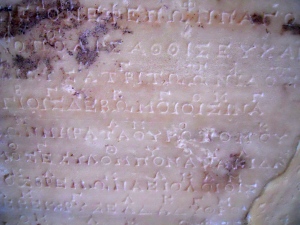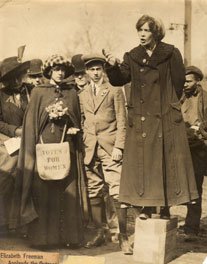Metablogging: Blogging about Academic Blogging

This picture is of the earliest known musical notation, found carved in stone at Delphi.
This summer, I blogged my trip to Greece. I used to have a blog five years ago or so, but it’s now defunct. I have friends who blog regularly, like Doctor J and anotherpanacea. They’ve been blogging productively for years. I let my blog go cold because it felt like more of a burden and an obligation than a tool to support my professional development.
But I was newly drawn to blogging by a number of factors. First, I was convinced by Christopher P. Long’s argument about the importance of “Cultivating an Online Scholarly Presence.” This factor is more about establishing the domain than the blog. In an Internet Age, having the capacity to control your online presence is crucial. Having my own domain allows people to find my work easily and enables me to curate my publications and public lectures to make people aware of my work. On this domain, I can collect published work that is already publicly available but perhaps difficult to find. I can inform people of my current and ongoing projects before they come to publication in a world where manuscripts often don’t make it to print until a year after completion. Building this online presence also gives a scholar leverage with publishers who are interested in the metrics that I can track on one’s domain, as Long describes in “Adventures in Open Access.”
 Second, as I have become increasingly interested in how philosophy can engage the public sphere, I began to think that blogging could be an avenue for me to articulate and develop thoughts about contemporary public life influenced by my philosophical perspective. Having an outlet allowed me the opportunity to synthesize and share insights that would occur to me. In turn, this process led me to think about how to further develop such projects in my professional non-blogging life. My post on Civic Engagement and Thinking is one example of this. Another is this one on Humans and Non-Humans in Aristotle and Latour. Yet another, my most highly trafficked post thus far thanks to links from Philosophy Matters on Facebook, was this post on Arendt’s conception of the banality of evil and many people’s tendency to demonize those with whom they disagree, as well as this and this post on whether thinking a certain way makes you evil (or good).
Second, as I have become increasingly interested in how philosophy can engage the public sphere, I began to think that blogging could be an avenue for me to articulate and develop thoughts about contemporary public life influenced by my philosophical perspective. Having an outlet allowed me the opportunity to synthesize and share insights that would occur to me. In turn, this process led me to think about how to further develop such projects in my professional non-blogging life. My post on Civic Engagement and Thinking is one example of this. Another is this one on Humans and Non-Humans in Aristotle and Latour. Yet another, my most highly trafficked post thus far thanks to links from Philosophy Matters on Facebook, was this post on Arendt’s conception of the banality of evil and many people’s tendency to demonize those with whom they disagree, as well as this and this post on whether thinking a certain way makes you evil (or good).
Third, I thought that blogging might also serve my students. In the philosophy department’s Senior Capstone course last semester, I had students blog about Public Philosophy here, and found the students’ struggle to engage the world illuminating. But it also made me see that students need models for how to do that successfully. I posted a number of times on that blog here and here but began to think I needed my own designated site to do that. Sometimes I even used this blog as an effort to develop ideas sparked by class discussion. I then encouraged students to consult these posts to further class discussion as in this post on Rousseau and Aristotle. That post and discussion has since led to a more developed and ongoing research project in which I address Rousseau and Aristotle’s conceptions of government are initially quite similar, but on closer reflection importantly distinct.
Blogging my Greece trip served all three of these ends: creating an online presence, developing research projects and furthering my teaching. A large motivation for me to get this domain up and running was to blog my trip. I thought it would be a good way to get students who are enrolled in my Ancient Philosophy course this fall interested and a way to take public notes, as Chris Long has said about livetweeting or liveblogging philosophy conferences. I’m looking forward to using my posts from my trip to Greece in my Ancient Philosophy course. What was surprising to me was how well it worked to focus my thinking, to encourage me to develop a narrative or specific questions and concerns about the things I saw or learned, and to engage with other scholars about important questions and problems as they came to me, “live” as we say in the tweeting and blogging world.
Instead of letting certain thoughts and intuitions be fleeting, because I knew I would blog, I thought longer and more carefully about things like the “authentic tourist experience“–why we want it, whether we can get it, and what it means to be at an historical and epochal distance from an ancient site. I thought about the distance between ancient Greek and modern Greek culture and how British and German scholars have formed ancient Greek culture in their study of it at a remove from modern Greek culture. My post on Greece for the Greeks sparked a lively conversation on Facebook with another scholar of post-colonial theory and later led to an extended conversation with a Greek friend and fellow philosopher whom we visited in Neapoli. His own research made him perfectly positioned to answer my questions about the relationship between ancient and modern Greece in conversations that I was especially attentive to because I knew I wanted to write a follow-up post. As one philosopher commented on that follow-up post, this topic is so complicated it could become another book. I thought about how religious spaces were political and economic spaces for the Greeks, especially Delphi, but also the Acropolis and Keremeikos in Athens.
In addition to focusing my thinking as a tourist in Greece, my plan to blog motivated me to do preliminary research before the trip about various archaeological sites– just good preparation, I know. But as a philosopher, I think it can be easy to let those details go for the sake of thinking the deep thoughts. I work in ancient philosophy and I have always thought knowing the history and culture and context of ancient texts was invaluable to being able to think with ancient philosophers. In some ways, I didn’t even realize before going to Greece what it was I didn’t know about that culture and milieu. I was so glad to have done the preliminary work–thinking about the relationship between particular sites and the gods whose cult they served, for example, opened the space for philosophical insight. It’s easier to be inspired when you’re prepared. Blogging also sent me back to various history books and mythology resources after I visited places to pull together the various details that made sense of a particular philosophical point. This was particularly the case at Delphi (and more on Delphi), Elueusis and Mycenae, but also in Athens.
Blogging a five-week trip (about 18 posts over six weeks because I began blogging about the trip before I left) habituated me to blog more regularly. I’m sure during the semester when I am teaching, it will be hard to blog as regularly. But the practice of a certain way of engaging the world that encourages me to reflect on how I might communicate to non-philosophers or non-academics about the things I work on has helped me think more clearly. It’s helped me to pay careful attention to what kind of background I would need to give to make a case. To further encourage such consideration in my students, I’m planning on requiring my Senior Seminar on Plato’s Republic to blog. And now, as I’ve been blogging a series about whether what we think makes us good or bad, I have been examining what I find to be difficult and unresolved (unresolvable?) philosophical dilemmas that in some philosophical circles are treated as already solved or not really dilemmas. I’m struck by how taking a question to a popular space forces an examination of certain philosophical mores and assumptions that professionals don’t really question.
I would be remiss if I did not mention the anxiety I had about blogging. There’s a reason Hegel wrote that the owl of Minerva only flies at night. Academics, but I think especially philosophers, like to ruminate. We like to take our time to think something through to make sure we are right or that we are clear on a particular reading or topic before airing our thoughts publicly. Some people have gone so far to suggest that this is what makes philosophy irrelevant, or at least, slow to respond to public issues, making it difficult for philosophers to be public intellectuals. Those who seem to reply quickly don’t always have the most to offer in a timely way. Moreover, there is considerable anxiety among untenured faculty or faculty who are not in permanent positions–the sets of faculty who tend to be younger and more blog-friendly–because we don’t want to be held to the same standards on the blogosphere that we are held to in traditional academic print media. These kinds of fears can have a silencing or at least a self-censoring effect that keeps faculty from making the kinds of critiques of those in power or of trends in higher education or in public life that might make the most impact. I should note: in philosophy, there are a number of collectives that have been good at cultivating these riskier conversations and protecting their members such as NewAPPS and xcphilosophy (there are also sites that I will not link to that have had a chilling effect on the field). Besides the politically volatile kinds of posts, academics often have pretty well-developed superegos, the internalized voice of authority, the voice of “the field” that says, well you can’t really say that. This internalized voice encourages us to play out in advance all possible counterarguments and to be shy of presenting ideas that are not fully formed. This is the voice that keeps all those manuscripts on our desks for much too long. There were some posts that I agonized over and then wished I hadn’t posted and could take back, but in the end I think the habit of regularly posting was more important than each post having the same weighty or imaginative insight. I wasn’t equally proud of each one, but I think that collectively they prompted questions and offered lenses for thinking about my experience of Greece. I thought of my audience as yes, other philosophers, but also students, colleagues in other departments, and people who just liked to read about travel. That helped me get the superego of philosophy as a discipline out of my head. I tried to operate on a principle of using the blog as a means to open up conversation through questions and insights that came to me that I was less interested in defending than in exploring and weighing. I’m continuing to follow that principle as I blog at home about public life and philosophical concerns.
All this to say, blogging my trip to Greece made me a more attentive, a more engaged, more connected, and yes, less anxious, traveler and thinker. I recommend it.





Trackbacks & Pingbacks